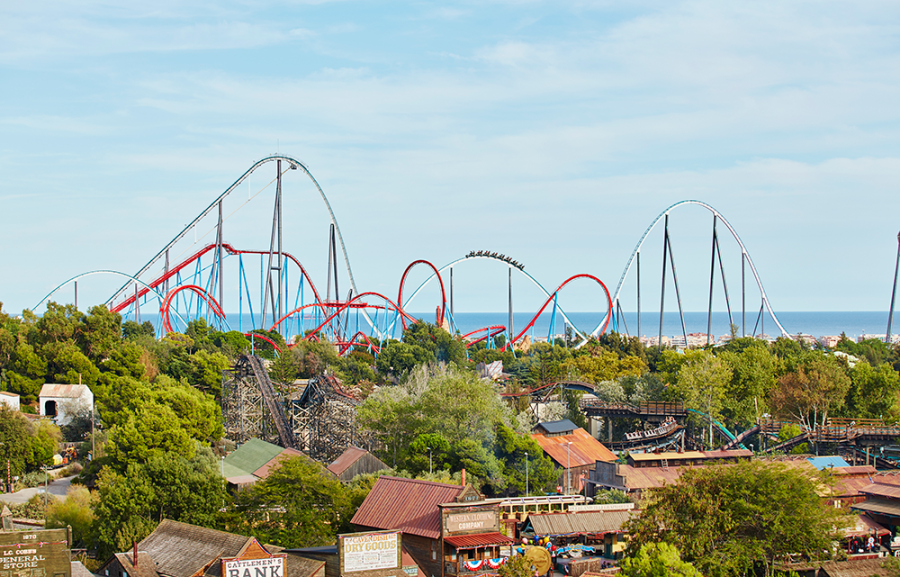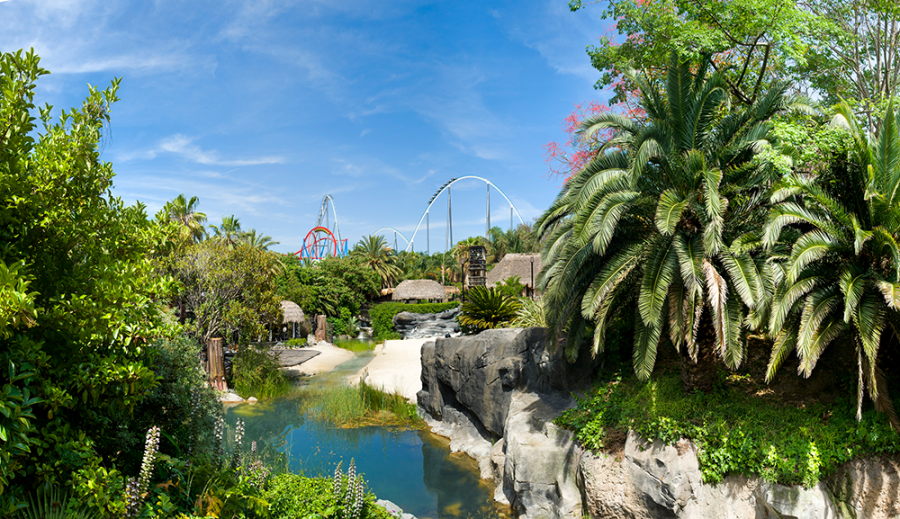Sustainability Success at Attractions
Spain’s PortAventura World theme parks and resorts and England’s Eden Project—a botanical garden in a reclaimed china clay pit—have one thing in common: They were founded with sustainability in mind. They work to protect the environment and educate the public about its preservation while managing to make a living. Funworld spoke with leaders from these attractions to see how they’re making it work.

Sustainability is Job No. 1
PortAventura World and the Eden Project have both been built to operate with degrees of sustainability and to improve their performance in this area over time.
“Our resort is operationally carbon neutral by design, constantly reducing and offsetting scope 1 (direct greenhouse gas [GHG] emissions that occur from sources controlled or owned by an organization) and scope 2 (indirect GHG emissions associated with the purchase of electricity, steam, heat, or cooling) GHG emissions,” says Choni Fernández, PortAventura World’s director of sustainability. “Our goal is to continue reducing emissions based on the Science Based Targets initiative and then offset our remaining emissions through the acquisition of carbon verified credits that will be used in the Conservation Project of the Guatemalan Coast, to which we are committed.”
PortAventura World is pursuing a zero-waste policy, having reused or recycled 97% of its waste in 2021. It is also seeking “to ensure the integration of sustainability in all processes and projects,” Fernández says. “For this reason, in 2022, PortAventura World will begin construction of a photovoltaic plant, among the largest in Europe. The project will prevent the emission of 4,000 tons of CO2 per year into the atmosphere, equivalent to the CO2 absorbed by 930,000 trees.”
The Eden Project is similarly built upon sustainability principles. “We made 83,000 tonnes of soil from recycled waste and continue to make our own compost to enhance our soils,” says Charles Sainsbury, Eden Project’s energy and sustainability manager. “We recycle our rainwater and groundwater, using it to flush the toilets and water the plants. Our cafes and shops sell products that are sourced with the environment in mind.”
The Eden Project obtains all of its electricity from renewable sources and operates its own electric vehicle fleet, as well. “As part of the United Nations Race to Zero initiative, and our ambition to become climate positive by 2030, we will go even further by generating our own energy,” Sainsbury says.
The Eden Project will achieve this last goal by using geothermal boreholes drilled nearly 5 kilometers into the ground. This will provide access to the Earth’s natural hot rocks, enabling Eden to meet its own heat and energy needs. The Eden Project is also looking to export surplus energy to local communities and businesses.

Solid Training
Sustainability-centric operations rely on the skills and commitment of employees to achieve their environmental and business goals. This is why solid, comprehensive staff training is central to operations at PortAventura World and the Eden Project.
“Training is one of the tools provided by PortAventura World to offer added value to its workers,” Fernández explains. “The company’s annual training plan includes all actions required to ensure that employees are prepared to adequately perform the duties and tasks of their job positions, extending their knowledge while reinforcing their skills and competencies.”
PortAventura World breaks its training into specific modules covering Corporate, Customized, Development, Environmental, Food Safety, and Safety skills. “Our training plan is open and dynamic, as our needs are always changing,” Fernández says.
The Eden Project provides a comprehensive catalogue of courses and learning plans for its staff. “A three-day Welcome Programme immerses all new team members in the key themes of positive transformation, regeneration, and sustainability, and how all staff work together to deliver Eden’s mission,” Sainsbury says. “Ongoing learning is continually provided, such as regular site tours to keep all members of staff updated on new projects, initiatives, and exhibitions taking place. The Eden Project site has engaging exhibits and events, for all ages, that show how visitors can contribute to fighting climate change and biodiversity loss. The team practices sustainability every day, and new staff learn from their peers.”
Advice to Other Operators
Fernández and Sainsbury have useful advice for amusement park and attractions operators wanting to make their facilities more sustainable.
“All stakeholders should be involved in formulating a park’s sustainability policy, especially employees, as well as managers,” says Fernández. “And communication is key. It’s very important to communicate your goals and methods, both internally and externally, since the beginning of any project affects its final results.”
Sainsbury emphasizes the importance of a clear strategy.
“Know your subject, have a comprehensive strategy with targets, and ensure that the strategy has been presented to staff in a way that is relevant to their own team,” he explains. “Focus on the areas of impact over which you can make the quickest and most material difference—this will help to build momentum and demonstrate clear action to your staff and audiences. Engage and educate your audiences on the journey too: What can they do to make a positive change?”
